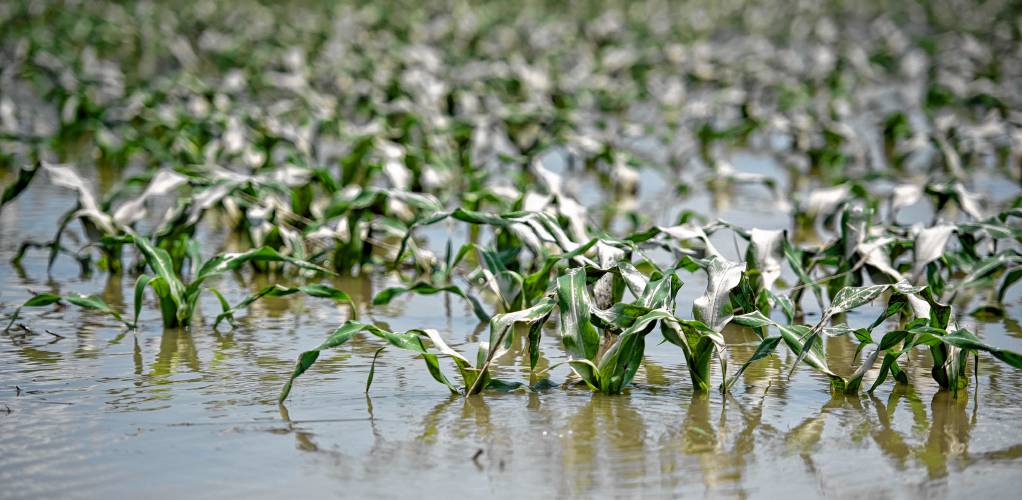Valley farmers spotlight agricultural drainage ditch troubles

Corn sits in standing water after a field was flooded off Aqua Vitae Road in Hadley in July. GAZETTE FILE PHOTO/CAROL LOLLIS
| Published: 03-25-2024 6:13 PM |
HADLEY — During a summer in which area farms dealt with significant rainfall and flooded fields, keeping agricultural drainage ditches cleared became essential to protecting crops by ensuring excess water could be removed.
Often, though, farmers found these ditches clogged by debris and silt, especially in locations where such ditches extended beyond a property line, and there was no means of cleaning them out.
“It’s a huge need, it’s becoming an increasing need, and towns need to come together to figure out how to maintain ditches to get water off the land that’s flooding on a regular basis,” said Matt Karas of Ashfield, a farmer who works for the Hampden Hampshire Conservation District.
The use of agricultural ditches as a means of coping with wet weather was a main topic at a roundtable held Friday at Plainville Farm in Hadley sponsored by the Hadley Climate Change Committee.
About 50 farmers were joined by representatives from government agencies, including the Natural Resources Conservation Service, the Farm Service Agency and the Hampden Hampshire Conservation District, along with nonprofits such as Community Involved in Sustaining Agriculture.
Jack Czajkowski, who co-chairs the climate committee, said figuring out how to deal with a changing climate is critical for farmers. “These last three years, it’s stunning to see what’s happened with the weather,” Czajkowski said.
His brother, Wally Czajkowski, who runs Plainville Farm, said ideas are needed to counter the damage caused by climate change.
Though Karas said agricultural ditches are likely outside the purview of local conservation commissions, which examine work within 100 feet of wetlands, they may be more regulated in some cities and towns than others.
Article continues after...
Yesterday's Most Read Articles
 Homeless camp in Northampton ordered to disperse
Homeless camp in Northampton ordered to disperse
 The Iron Horse rides again: The storied Northampton club will reopen at last, May 15
The Iron Horse rides again: The storied Northampton club will reopen at last, May 15
 Final pick for Amherst regional superintendent, from Virgin Islands, aims to ‘lead with love’
Final pick for Amherst regional superintendent, from Virgin Islands, aims to ‘lead with love’
 Authorities ID victim in Greenfield slaying
Authorities ID victim in Greenfield slaying
 Reyes takes helm of UMass flagship amid pro-Palestinian protests
Reyes takes helm of UMass flagship amid pro-Palestinian protests
 Police report details grisly crime scene in Greenfield
Police report details grisly crime scene in Greenfield
Michael Docter, another Hadley farmer on the Climate Change Committee, said even if wetlands bylaws don’t apply to the ditches, it doesn’t help a farmer if a neighboring landowner is filling a ditch with brush. Docter suggested the state Legislature get involved to ensure all ditches are being cleaned, allowing water to flow through them.
Other farmers asked that the Natural Resources Conservation Service do training so local conservation commissions are consistent in how they evaluate work 0n ditches.
In Hadley, Town Administrator Carolyn Brennan said keeping agricultural ditches cleared has been a priority for the town’s Department of Public Works, though officials understand that some ditches may be affected by state and local wetlands laws. Brennan said town officials are putting an inventory together.
Still, Brennan said conversations with the state’s Department of Environmental Protection would be helpful, noting the town was fined over having a crew make repairs to one ditch.
Programs that help farmers with debris cleanup, re-leveling fields where gullies have torn through and repairing roads are available through the Farm Service Agency, said Thomas Cairns, a farm technology specialist at the agency. In order to be compliant and eligible for such U.S. Department of Agriculture funding, farmers can maintain and clean ditches, he said, but there will be concerns if a farmer is expanding these ditches or going deeper than the ditch’s historic footprint.
“In order to be compliant or eligible for USDA, you are able to maintain and clean any ditches that have been existing since 1985 or have been inspected by NRCS in the past,” Cairns said.
Sylvia Muniz-Gaya, district conservationist for Natural Resources, provided an overview of support farmers can seek, including from the federal Inflation Reduction Act. That bill is providing money for climate mitigation, crop rotation and water management.
“We all play a big part in trying to address what we’re currently facing, especially as we’ve noticed the changes these past three years in the Valley,” Muniz-Gaya said.
Stephen Taranto, program coordinator at CISA, gave an overview of the Climate Smart Commodities Project, which encourages farmers to use smart farming practices and can cover 100% of costs. The program includes a partnership with the Northeast Organic Farming Association.
Jamie Newland, executive director of the Hampshire County Farm Service Agency, discussed insurance and emergency relief programs that are meant to reward people who already have insurance but who have suffered losses. With a small staff, Newland said there is more pressure from climate change.
Daniel Smiarowski, executive director of the state’s Farm Service Agency, said it’s important to know that is happening, and he appealed for farmers to let his agency know when there are natural disasters. “If you have a loss, please report it to your local office,” Smiarowski said. Having this information in hand allows him to make appeals to the state and federal lawmakers.
As for ideas to mitigate climate change, Ellen Drews, manager at Astarte Farm in Hadley, said that she has found no-till methods have been effective, both during wet summers like last year’s, and in dry summers that preceded it.
“We’ve gone to no-till and we’re doing fully reduced till in all areas of the farm and it has extremely benefited us, buffering us from both dry years and wet years,” Drews said.
But Hadley farmer Edwin Matuszko said it’s unclear if the support from government agencies will actually help farmers.
“We don’t want to waste money. Period. We just want to spend money wisely and that’s it,” Matuszko said.
Financial support from state agencies, he said, can also come with lengthy approvals.
“The state takes an awful long time,” Matuszko said. “We can’t wait, because we have insurance bills, we have electric bills, we have payments to make, we can’t wait six, eight, nine, 10 months.”
Scott Merzbach can be reached at smerzbach@gazettenet.com.

 Federal probe targets UMass response to anti-Arab incidents
Federal probe targets UMass response to anti-Arab incidents Locking up carbon for good: Easthampton inventor’s CO2 removal system turns biomass into biochar
Locking up carbon for good: Easthampton inventor’s CO2 removal system turns biomass into biochar William Strickland, a longtime civil rights activist, scholar and friend of Malcolm X, has died
William Strickland, a longtime civil rights activist, scholar and friend of Malcolm X, has died
